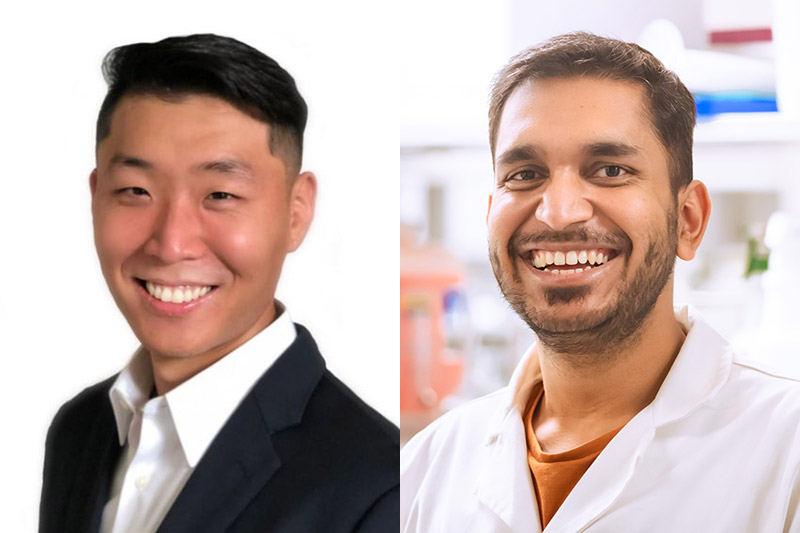By Stephen Greenwell
 |
| Ted Kim (left) and Aman Agrawal (right) |
A pair of student researchers in the William A. Brookshire Department of Chemical and Biomolecular Engineering Department at the Cullen College of Engineering have been recognized for their work by the Axalta Bright Futures Scholarship Program.
The scholarship recipients are Ted Kim, a senior undergraduate, and Aman Agrawal, a doctoral student. Both will receive renewable, $5,000 scholarships. Each year, a maximum of 16 students total are chosen from universities and colleges in five geographical areas — Houston, Philadelphia, Detroit, Rochester in New York and Fort Royal in Virginia.
Kim is an undergraduate researcher who is working in the Vekilov Lab, under the supervision of Peter Vekilov, Ph.D., Moores Professor.
“Current treatments of Alzheimer's disease only address the symptoms and oftentimes fail to better the patient outcomes and quality of life,” he said. “Alzheimer's disease is caused by the accumulation of amyloid plaque and neurofibrillary tangles that irreversibly degrades and destroys neurons and shrinks brain tissue. The project that I am working on involves understanding the fundamentals of the growth kinetics of these different structures of amyloid beta protein fibrils that are strongly linked to the progression of Alzheimer’s Disease. Once we gain a deeper understanding of how these proteins grow, we can develop more effective cures and treatments that can slow and reverse the disease.”
Agrawal is working on two research topics in the Functional Polymer Nanocomposite Laboratory, which is run by Alamgir Karim, Ph.D., Dow Chairman and Welch Foundation Professor. Agrawal's first research topic has been related to artificial cells and the origin of life.
“A small part of the scientific community has been working to find the possible origins of life on the early Earth. The complex biological cells that we see today should have evolved from much simpler ones, called protocells, sometimes made of long, chain-like molecules called polymers,” he said. “I have had the good fortune to learn about this field of research during my pre-doctoral work in South Korea. Upon arriving at UH, I started working on the idea of making minimalistic artificial polymeric cells mimics, called coacervates, capable of doing biochemical reactions. Our research not only advances the knowledge of prebiotic life, but also develops potential use of these cell mimics in drug manufacturing and delivery.”
Agrawal's other research topics have been focused on making better polymer coatings, for applications ranging from waterproof packaging to anti-corrosion materials for the airline industry.
“Scientists around the world, including my advisor, have been working on a special type of polymer coating which is really thin, roughly 100 times thinner than our hair strands,” he said. “These thin coatings not only reduce the amount of polymer used, they also provide interesting properties, such as structural coloration — color without pigments. My work has been to understand the structure of these thin coatings and their decay and degradation in adverse environmental conditions. By looking at how they behave at elevated temperatures or in various industrial solvents, we came up with better design ideas and improved techniques for their fabrication.”
For Kim, the journey to UH and the Cullen College of Engineering specifically has been longer than for some other students. He sees this honor as a reflection of some of that hard work he's done.
“When I applied to UH as a transfer student, I was not immediately accepted into the College of Engineering because my grades weren’t high enough at the previous institution, but the staff gave me the opportunity to prove myself,” he said. “The staff in the Department of Chemical and Biomolecular Engineering, and the Cullen College of Engineering, were pivotal in my journey to get to this point.”
Agrawal, who grew up in the small city of Etawah in northern India, said his parents, Rajesh and Nutan, have “ceaselessly supported” him, and encouraged him to continue his educational efforts, as well as Karim.
“I owe a debt of gratitude to my advisor, professor Alamgir Karim, for opening his lab door for me to do independent, blue-sky research,” Agrawal said. “I met him at a conference during my undergrad work and enjoyed talking to him. I didn’t realize that two years later I would be working with him. His intellectual comments and excitement toward new science motivates me everyday. This has helped me in preparing myself for a life in academic research, where I see myself in the foreseeable future.”
Agrawal identified several other mentors who were instrumental for him.
“Professors Jacinta Conrad and Peter Vekilov have been of immense help as well, in scientific discussions and lab access. I also closely collaborate with Dr. Jack Douglas, who is a scientist at NIST [National Institute of Standards and Technology]. Discussing relevant scientific theories with him helps me in gaining deeper understanding of my experimental work. I also want to thank my previous advisors, professors Ashutosh Sharma at the Indian Institute of Technology Kanpur, and Steve Granick [now at the University of Illinois] and John King at the Institute for Basic Science, Center for Soft and Living Matter in South Korea, whose mentoring have played a major role in my interest in scientific research, leading to this award.”
Long-term, Kim would like to become a R&D scientist or engineer, working on developing carbon negative solutions in the energy and materials field. Kim identified four people as being key resources while at UH.
“Dr. Peter Vekilov, and graduate students Sima Mafi, David Yang and Alex Xu have been instrumental in my development as a researcher and a student,” he said. “It was because of them that I was able to succeed here at the University of Houston.”
Learn more about the Bright Futures Program